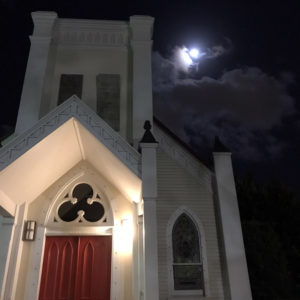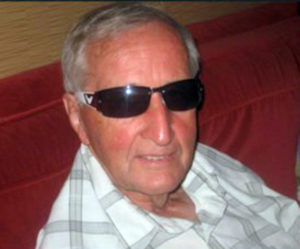It was Concordia this past Monday: a feast of Ancient Rome in which folks would gather for a meal with the express purpose of resolving all disputes. A lovely idea, I think, but since we are not encouraged to gather these days, I didn’t bother to write about it. Still, Concordia remained at the back of my head all that day: the concept of goodwill behind it felt like the kind of holiday my friend Seamus Murtagh could really get behind.
The weekend before, we got the news that Father Seamus had left this earthly life. If the name sounds familiar, perhaps you are a subscriber to the other bit of writing I do, the Convivio Dispatch from Lake Worth. In the Dispatch, years ago, I made Father Seamus the pastor at St. Bernard’s here in town. The thing to understand about the Dispatch (and I think most of my readers understand this) is that it is an exercise in creative nonfiction: a bit of local reality peppered with some things I’ve made up. When I was a boy, my grandmother, Assunta, an immigrant from Apulia in Southern Italy, would accuse me of “telling stories” whenever she caught me in a lie, and it’s kind of funny that she was right: this is what I do. I tell stories and after a while no one knows what is fiction and what is not, not even me. I mean no harm by it; I just like a good story.
Here’s what is fact: Father Seamus was a great guy. He was the pastor at St. Ann’s in West Palm Beach, the oldest Catholic church in the county, which is the very last church that John F. Kennedy attended, the Sunday before his trip to Texas, and which looks nothing like most churches in Florida for it was built back when this place was a pioneer town, in the very early 1900s. My first visit was for the Feast of the Assumption, my grandmother Assunta’s birthday, on the Fifteenth of August one year soon after we got our home in Lake Worth. Father Seamus was not there then; St. Ann’s was run by Jesuits at first and they were there that first visit. Seamus came not long after the Jesuits left. What a fine man he was. Seamus always warmly welcomed me, and Seth, too . . . which is not the typical response a gay couple get at a Catholic church. He reminded us that it was our church as much as anyone else’s, and that we should always feel welcome.
I’d bring my entire family to Seamus’ special services: to communal reconciliation, to Holy Thursday Mass, to Easter Vigil Mass. Between Adriana Samargia’s beautiful singing and Father Seamus’ moving homilies, the experience was always sublime. He’d tell great stories. And he’d recite poetry. Out of nowhere, it would seem: standing before the congregation, holding the inside sleeves of his vestments as he recited––a habit, you could tell, that he picked up as a schoolboy. He was Irish through and through, born in the old country in County Roscommon, and when he told jokes his accent would grow thicker the nearer he got to the punch line. Father Seamus made us all feel so good about being human and striving for connection with others and with God. And I will always remember him, too, quietly launching into these words at every Mass, after communion:
Lord, I believe in you: increase my faith.
I trust in you: strengthen my trust.
I love you: let me love you more and more.
I am sorry for my sins: deepen my sorrow.
I worship you as my first beginning,
I long for you as my last end,
I praise you as my constant helper,
And call on you as my loving protector.
I want to do what you ask of me:
In the way you ask,
For as long as you ask,
Because you ask it.
Let me love you, my Lord and my God,
And see myself as I really am:
A pilgrim in this world,
A Christian called to respect and love
All whose lives I touch.
Amen. It is the pilgrim in this world part that always touched me, and I think it resonated with him, too. And now he has moved on, from this world, on another pilgrimage of sorts. I can count on one hand all the times I’ve been back to St. Ann’s since Father Seamus retired and the day I decided it just wasn’t the same welcoming place for me as it had been whilst in his care. Be that as it may, Seamus and I will still get together at St. Bernard’s in those Convivio Dispatches. He’ll always be the pastor at St. Bernard’s, and Sister Kathleen, the Reluctant Organist, she will always be in charge of the music ministry. Seamus will still come round for bacon and peanut butter sandwiches at Minnie’s Diner, and he will inevitably bump into my neighbor Margaret on occasion. Margaret, too, has been known to recite a poem when the mood strikes. The Great Seamus v. Margaret Poetry Showdown that happened as they sat side by side at Minnie’s counter still is the stuff of legend in this town. We all remember it as the fine spring morning when Margaret got Seamus flummoxed with one of the sexier stanzas of Robert Herrick’s Corinna’s Going a Maying:
And so Father Seamus will live on here in Lake Worth. I will keep him here with us, for this is my job, this is what I do. No one else will be the wiser, but you: you will know the real story. That this good man really did walk this earth for a spell, and made it a welcoming place.
Father Seamus as Uncle Seamus in a family photo shot by his niece, Christina. Top photo: the original St. Ann’s Church, West Palm Beach, built in 1902.
†




